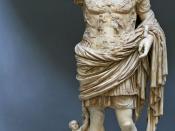"Autobiography is now almost as common as adultery, and almost as reprehensible," wrote Lord Altrincham. Whether writing an autobiography is as reprenhensible is open to debate, but Lord Altrincham did get one thing right: that many people, even the most obscure citizen, are writing autobiographies. Some authors are even taking to writing fictional ones for historical figures who have been dead for millenia.
In these books a modern author assumes the role of a historical figure and recounts the subjects life and history of the time period through a first person narritive.
Claudius the God by Robert Graves and Augustus by Allan Massie are two such books. The protagonists in these novels, Claudius and Augustus, were both emperors of Rome at the height of its power making them ideal candidates for such a work. The application of a modern author's perspective to an era whose history books are already full of bias, rumour, and unfounded opinion is an interesting premise, but is it actually effective?
The answer is yes, the fictional autobiography is an effective and entertaining genre, because it allows for vast amounts of both explicit and implicit characterization, which gives the reader a real insight into the true nature and beliefs of the of the protagonists, which allows the reader to develop connections with the protagonist.
These connections are important because they allow the reader to fully empathize with the protagonist and thus be affected and entertained by the plot of the novel. If these connections do not exist then the reader will not care what happens to the protagonist, and thus the fictional autobiography will fail to be engaging, because the plight of the protagonist is of such importance to the novel.
This all-important characterization is achieved implicitly through the protagonists' relations with women, how power corrupts...


